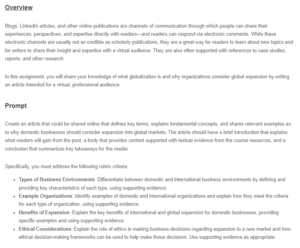Discussion – Globalization
The modern-day environment is becoming highly competitive, thus prompting business people to expand their operations to global markets to increase their market share. However, some organizations are reluctant to join global markets because they do not know what to expect and how to maintain operations in a global business environment. Therefore, this overview of the difference between international and domestic business environments defines and provides the main characteristics of each type and explains the benefits of global and international expansion for domestic businesses as well as the role of ethics in making business decisions about expansion to new markets and how ethical-decision-making systems can be used to help make these decisions.
Types of Business Environments
The main types of business environments are international and domestic environments. A domestic business environment restricts business transactions within a country’s geographical boundaries. On the other hand, a global business environment allows business transactions across different countries. According to Morrison (2011), the main characteristics of a global business environment are a large scale of operations, integration of the economies of many countries, greater immobility of factors such as capital and labor, and a wide range of business restrictions, including licensing requirements, subsidies, and tariffs. The main characteristics of a domestic global environment are limited regulation, the concentration of demand and supply in one area, and limited access to raw materials.
Example of Organizations
Walmart is among the organizations operating in the international business environment. The organization meets the criteria of an international organization because it operates in 24 countries and sources products from over 100 countries with unique economic, cultural, political, and social practices and institutions. Organizations such as Sturm, Ruger & Company, Inc. have maintained operations in the domestic environment limiting their activities in the United States. These organizations meet the criteria of a domestic environment because the sale of their products is restricted to the United States.
Benefits of Expansion
One of the main benefits of expanding to global markets is increased revenue because the organization increases its market share. Companies such as Walmart attribute their revenue growth to global expansion because the revenue from global markets accounts for 23% of the total revenue (Nandgaonkar, 2021). The second benefit is increased business growth due to the increase in revenue. Organizations that have expanded globally have experienced significant growth by expanding their global footprint to other global markets.
Ethical Considerations
Ethics helps organizations limit their environmental footprint within what is required by the local laws in the global markets. For instance, organizations need to provide the working conditions required by law in the global business environment, avoid child labor and refrain from other unethical practices such as corruption and bribery. Ethical decision-making frameworks can be used to make ethical decisions by solving ethical dilemmas, particularly in employee relations and how the organization’s activities could affect the community.
References
Morrison, J. (2011). Globalization and the business environment. The Global Business Environment, 39-74. https://doi.org/10.1007/978-0-230-34437-2_2
Nandgaonkar, R. (2021, May 19). Walmart’s revenue by segment (2017 – 2021). Business Quant. https://businessquant.com/walmart-revenue-by-segment
Blogs, LinkedIn articles, and other online publications are channels of communication through which people can share their experiences, perspectives, and expertise directly with readers—and readers can respond via electronic comments. While these electronic channels are usually not as credible as scholarly publications, they are a great way for readers to learn about new topics and for writers to share their insight and expertise with a virtual audience. They are also often supported with references to case studies, reports, and other research.

Discussion – Globalization
In this assignment, you will share your knowledge of what globalization is and why organizations consider global expansion by writing an article intended for a virtual, professional audience.
Prompt
Create an article that could be shared online that defines key terms, explains fundamental concepts, and shares relevant examples as to why domestic businesses should consider expansion into global markets. The article should have a brief introduction that explains what readers will gain from the post, a body that provides content supported with textual evidence from the course resources, and a conclusion that summarizes key takeaways for the reader.
Specifically, you must address the following rubric criteria:
- Types of Business Environments: Differentiate between domestic and international business environments by defining and providing key characteristics of each type, using supporting evidence.
- Example Organizations: Identify examples of domestic and international organizations and explain how they meet the criteria for each type of organization, using supporting evidence.
- Benefits of Expansion: Explain the key benefits of international and global expansion for domestic businesses, providing specific examples and using supporting evidence.
- Ethical Considerations: Explain the role of ethics in making business decisions regarding expansion to a new market and how ethical decision-making frameworks can be used to help make these decisions. Use supporting evidence as appropriate.

